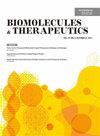Ginsenosides Decrease β-Amyloid Production via Potentiating Capacitative Calcium Entry.
IF 3.2
3区 医学
Q2 PHARMACOLOGY & PHARMACY
引用次数: 0
Abstract
Alzheimer's disease (AD) is a progressive and irreversible neurodegenerative disorder characterized by extracellular amyloid plaques composed of amyloid β-peptide (Aβ). Studies have indicated that Ca2+ dysregulation is involved in AD pathology. It is reported that decreased capacitative Ca2+ entry (CCE), a refilling mechanism of intracellular Ca2+, resulting in increased Aβ production. In contrast, constitutive activation of CCE could decrease Aβ production. Panax ginseng Meyer is known to enhance memory and cognitive functions in healthy human subjects. We have previously reported that some ginsenosides decrease Aβ levels in cultured primary neurons and AD mouse model brains. However, mechanisms involved in the Aβ-lowering effect of ginsenosides remain unclear. In this study, we investigated the relationship between CCE and Aβ production by examining the effects of various ginsenosides on CCE levels. Aβ-lowering ginsenosides such as Rk1, Rg5, and Rg3 potentiated CCE. In contrast, ginsenosides without Aβ-lowering effects (Re and Rb2) failed to potentiate CCE. The potentiating effect of ginsenosides on CCE was inhibited by the presence of 2-aminoethoxydipherryl borate (2APB), an inhibitor of CCE. 2APB alone increased Aβ42 production. Furthermore, the presence of 2APB prevented the effects of ginsenosides on Aβ42 production. Our results indicate that ginsenosides decrease Aβ production via potentiating CCE levels, confirming a close relationship between CCE levels and Aβ production. Since CCE levels are closely related to Aβ production, modulating CCE could be a novel target for AD therapeutics.人参皂苷通过增强容性钙离子进入减少β-淀粉样蛋白的产生
阿尔茨海默病(AD)是一种进行性和不可逆的神经退行性疾病,其特征是由淀粉样β肽(Aβ)组成的细胞外淀粉样斑块。研究表明,Ca2+ 失调与 AD 病理学有关。据报道,细胞内 Ca2+ 的再充盈机制--容性 Ca2+ 进入(CCE)减少,导致 Aβ 生成增加。相反,CCE 的组成性激活可减少 Aβ 的产生。众所周知,人参能增强健康人的记忆力和认知功能。我们以前曾报道过,一些人参皂甙能降低培养的初级神经元和AD小鼠模型脑中的Aβ水平。然而,人参皂苷降低Aβ水平的作用机制尚不清楚。在这项研究中,我们通过考察各种人参皂苷对CCE水平的影响,研究了CCE与Aβ生成之间的关系。降低 Aβ 的人参皂甙(如 Rk1、Rg5 和 Rg3)可增强 CCE。相反,没有降低 Aβ 作用的人参皂甙(Re 和 Rb2)则不能增强 CCE。2-aminoethoxydipherryl borate(2APB)是一种 CCE 抑制剂,它的存在抑制了人参皂甙对 CCE 的增效作用。单独使用 2APB 会增加 Aβ42 的产生。此外,2APB 的存在能阻止人参皂甙对 Aβ42 生成的影响。我们的研究结果表明,人参皂苷通过增强 CCE 的水平来减少 Aβ 的生成,证实了 CCE 水平与 Aβ 生成之间的密切关系。由于CCE水平与Aβ生成密切相关,调节CCE可能成为AD治疗的一个新靶点。
本文章由计算机程序翻译,如有差异,请以英文原文为准。
求助全文
约1分钟内获得全文
求助全文
来源期刊
CiteScore
6.60
自引率
8.10%
发文量
72
审稿时长
6-12 weeks
期刊介绍:
Biomolecules & Therapeutics (Biomolecules & Therapeutics) (Print ISSN 1976-9148, Online ISSN 2005-4483) is an international, peer-reviewed, open access journal that covers pharmacological and toxicological fields related to bioactive molecules and therapeutics. It was launched in 1993 as "The Journal of Applied Pharmacology (ISSN 1225-6110)", and renamed "Biomolecules & Therapeutics" (Biomol Ther: abbreviated form) in 2008 (Volume 16, No. 1). It is published bimonthly in January, March, May, July, September and November. All manuscripts should be creative, informative, and contribute to the development of new drugs. Articles in the following categories are published: review articles and research articles.

 求助内容:
求助内容: 应助结果提醒方式:
应助结果提醒方式:


